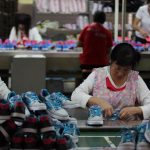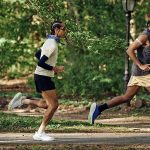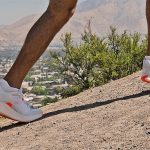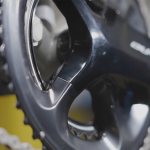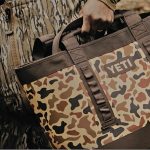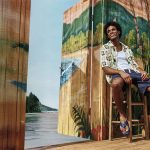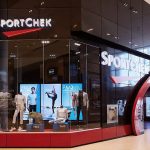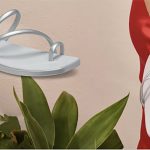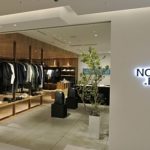Active Brands’ recent hiring of former Nike executive Christophe Merkel ushers in a new era for the Norwegian, multi-brand, outdoor company, whose holdings include female outdoor apparel/lifestyle brands Kari Traa and Johaug, protective gear company Sweet Protection and Nordic apparel company Daehlie.
The former vice president and general manager of Nike EMEA North, Merkel, takes the reins of Norway’s leading sporting goods company to continue its digital and market expansion. SGB Executive caught up with the new CEO for his take on Active Brands’ future plans, making the jump from Nike, Active Brands sustainability initiatives, and upcoming product initiatives.
What did you learn at Nike that you can carry over to Active Brands? Active Brands is on an accelerated growth journey, and with the pandemic, we’ve seen consumers move even more towards digital. My experience working as a general manager in multiple regions of the world with Nike can help Active Brands capture its full potential. We have strong and authentic brands with a Nordic heritage that consumers worldwide want to connect with. My feeling is that’s it’s key how we connect deeply with these consumers through digital and in key markets such as North America and further scale our organization and operations to support our international growth.
How different and/or similar are the two companies? Both companies certainly have a strong internal culture. I’m impressed with the passion the Active Brands team has for the brands and how obsessed everyone is to develop the best and most sustainable products to support our athletes and consumers in their sport or activities. The company’s size still allows for fast decision-making, which suits the entrepreneurial and growth mindset everyone has. There is a lot of professionalism and joy and fun in how the teams interact, which is inspiring.
One thing that’s unique about Active Brands is its strong focus on the female athlete and consumer. Kari Traa and Johaug are both female-only brands founded by incredibly inspiring and successful female athletes. Kari Traa’s goal is to inspire all women to be happier, healthier and stronger, and promotes confidence and love of life through an active lifestyle outdoors. For many years, Kari Traa has been a pioneer in taking a clear stance on gender equality and unhealthy body ideals. And Johaug is the most feminine and hardcore training brand for women out there, and we have high expectations as it continues to grow and inspire more women globally.
What prompted Kari Traa to create a video calling on the industry to come together for sustainability? Our team has had a lot of internal discussions about sustainability and has been making changes in every part of our business possible. We found some fantastic ways to approach sustainability – like Wastelayer and our packaging initiative, which reduced our plastic use in packaging by 97 percent. We wanted to share these ideas with our industry peers so they can get to these solutions faster. Why re-invent the wheel? Creating an open dialogue and essentially making some of our “secrets” open and available to other brands seems like the fastest and best way to propel our entire industry forward in the global mission to help our Earth. We received a fantastic response from our peers and competitors and hope others will continue to share in this dialogue and conversation in the spirit of driving change.
Norway is known for its environmental ethos. What are your plans for Active Brands regarding sustainability? Sustainability has always been highly prioritized in Active Brands, even by Norwegian standards. The company is highly rated by third-party organizations as an early adopter within this field, and it’s received a lot of positive feedback, both from the industry and consumers, for being transparent and open to knowledge sharing with its competitors. This topic will continue to be important for us — focusing our efforts on where we can make the most impact on climate and our planet. We will keep investigating new business models and making sustainable choices, aiming for sustainable, long-lasting and circular products. This is not an option for us. It’s a must.
The pandemic has fueled a skiing boom, especially backcountry and cross country. Do you think the upcoming Winter Olympics will have a similar effect on the mainstream market? Indeed, more people than ever have experienced backcountry and cross-country skiing for the first time during the pandemic. The Olympics will further fuel this trend and be a great arena for our brands and athletes to inspire even more people to get out and enjoy these amazing sports. While we don’t have any specific data to share, we do feel that naturally, there will be an uptick in the mainstream trying out experiences like this. That’s one of the inspirational aspects of the Olympics—it encourages people to get outside, try new sports to stay active and get time in the great outdoors.
Kari Traa has its largest line of women’s ski apparel launching this upcoming season. Why such a big push? The KT brand has a legacy in the skiing category, with an Olympic gold medalist in freestyle skiing as its founder. It is part of the brand’s DNA and heritage. But more important is the consumer. At the end of 2019, the KT team used consumer insight to redefine the brand through the lens of the consumers’ needs and expectations. It discovered an open space for a female-only player in both the outdoor and the snowsport category. We’ve also seen a big change in consumer behavior during the pandemic. New consumer groups are blooming that support our strategies.
Your new Wastelayer collection just dropped, made from recycled fabric scraps, wood pulp and cotton fibers. How hard was that to implement? Creating products from recycled fabric scraps was a relatively simple endeavor that has a significant impact. We could take those fabric scraps and break them down into new fabric to create whole pieces that could be made into new apparel. We found that the color that came out of the latest clothing was a beautiful gray. We could not use dye as well, which further helps support our sustainable efforts.
What are some of the other key product innovations your brands are debuting this season? We’re very excited about Sweet Protection’s new Trooper 2Vi MIPS and Grimnir 2Vi MIPS helmets, with the all-new and revolutionary technology platform 2Vi, allowing increased protection performance compared to the previous generation helmets at both low- and high-impact speeds without compromising weight and volume. It’s also presenting a new, premium freeride ski apparel line with its Crusader series and introducing the Aksel Lund Svindal all-mountain ski apparel collection.
With Daehlie, we’re excited about launching the “world’s fastest race suit,” which will be used by the Norwegian national cross-country team in the upcoming Olympics. It’s also launching the “conscious concept,” a cross-country skiing jacket and pants made from recycled fabrics.
Kari Traa presents its largest skiwear collection to date, which includes its first sustainable ski outerwear collection. The new Voss Jacket and Pant feature Repreve Our Ocean fiber sourced from bottles at high risk of entering the ocean, a root cause of ocean plastic. The bottles are collected within 30 miles of coastlines in countries or areas that lack formal waste or recycling systems. This ski set also features Rudolf Bionic Finish ECO, a sustainable and fluorine-free durable water-repellent treatment. We have a lot going on that we’re excited to introduce to the market.
Photo courtesy Active Brands


